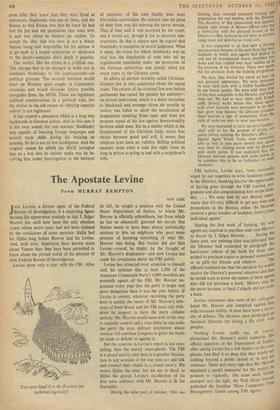The Apostate Levine From MURRAY KEMPTON
NEW YORK
JACK LEVINE, a former agent of the Federal Bureau of Investigation, is a surprising figure because his appearance reminds us that J. Edgar Hoover has until now been the only absolute tyrant whose secret court had not been violated by the revelations of some apostate. Stalin had his Djilas long before Hoover had his Levine. And, until now, Americans have known more about Yemen than they have been permitted to know about the private world of the director of their Federal Bureau of Investigation.
Levine spent only a year with the FBI. After
'You ntust hand it to the Russians for technical ingenuity!'
he left, he sought a position with the United States Department of Justice, to which Mr. Hoover is officially subordinate, but from which he has so adamantly guarded his secrets that Justice seems to have been almost pathetically anxious to hire an employee who gave some promise of knowing something of what Mr. Hoover was doing. But Justice did not hire Levine—cowed, he thinks, by the thought of Mr. Hoover's displeasure—and now Levine has made his complaints about the FBI public.
Levine has attracted most attention to himself with his estimate that at least 1,500 of the American Communist Party's 6,000 members are presently agents of the FBI. Mr. Hoover an- nounces every year that the party is larger and more dangerous than it was the year before. If Levine is correct, whatever recruiting the party does is mainly the result of Mr. Hoover's infu- sions of fresh blood, and the FBI need only with- draw its support to have the party collapse entirely. Mr. Hoover would seem well on his way to majority control and a time when he can make the party the iron, militant instrument whose menace will convince Congress to grant the funds he needs to defend us against it.
But the concrete in Levine's report is less com- pelling than the merely atmospheric. The FBI is a closed society, and there is a peculiar fascina- tion in any account of the way men act and talk and conduct their rituals in a closed society. We revere Djilas the man, but we are in thrall to Djilas the gossip. Levine's recollection of his first mass audience with Mr. Hoover is fit for Suetonius:
During the latter part of October, 1960, our training class received extensive briefing and preparation for our meeting with the Director•
The duration of this preparation was approxi- mately eight hours. A Bureau official who had a familiarity with the physical layout of the Director's office lectured us for close to an hour using maps and sketches as visual aids.
It was explained to us that such a briefing was necessary because in the past there had been I incidents in which new agents had walked In and out of undesignated doors, stumbled into desks and had tripped over door saddles all In the presence of the Director. These new agents did not graduate from the training programme. We were then briefed for about an hour on our personal appearance. We were instructed
to wear dark suits with a folded handkerchief
in our breast pocket. We were told what kind of tics were acceptable to the Director and which
were not. We had to wear shirts with French cuffs. Several weeks before this, those agents. with short haircuts were instructed to let their hair grow long because the Director considers short haircuts a sign of immaturity. Even the style of socks we were to wear was dictated.
We were instructed to carry an extra handker' chief with us for the purpose of drying our palms before entering the Director's office. • ' Special Agent Victor Turin, class counsellor, told us that in past years several new agents were fired for shaking hands with the Director with moist palms. It was explained that the Director distrusts persons with moist palms, as he considers this to be an indication of weak character.
FBI trainees, Levine says, 'were constantly urged by our superiors to write laudatory letters to the Director, thanking him for the opportunity of having gone through the FBI training PO' gramme and also congratulating him on his birth- day. . . . We were told by our Bureau super- visors that it's very difficult to get pay rises and promotions in the Bureau, unless the Director receives a great number of laudatory letters from individual agents.'
'During the first week of training, the new agents are required to purchase and read Masters of Deceit by J. Edgar Hoover. . . . During the latter part, our training class was informed that the Director had consented to autograph the hard-cover edition of his book for those who wished to purchase copies as personal mementoes or as gifts for friends and relatives. . • • Th,e, officials reminded me that the purchase list wont" receive the Director's personal attention and that he would want to know the names of those agents who did not purchase a book.' History may be the purer because, at least, Caligula did not write a book.
Levine remembers that most of his colleagues hated Mr. Hoover and conspired against him with incessant futility. It must have been a neces sity of defence. The Director once discharged an Assistant Director for hiring a file clerk withpimples.
Nothing Levine could say, of course, diminished Mr. Hoover's awful authority. Ws official superiors in the Department of Justice, after asking Levine for a full dossier on his com- plaints, had filed it so deep that they would say nothing beyond a public denial of its and his existence. There was every sign that Mr. Hoover remained a model instructor for the society he protects so vigilantly. The same week Levine emerged into the light, the Wall Street Journal published the headline 'More Companies rind Management Talent among FBI Agents.'














































 Previous page
Previous page